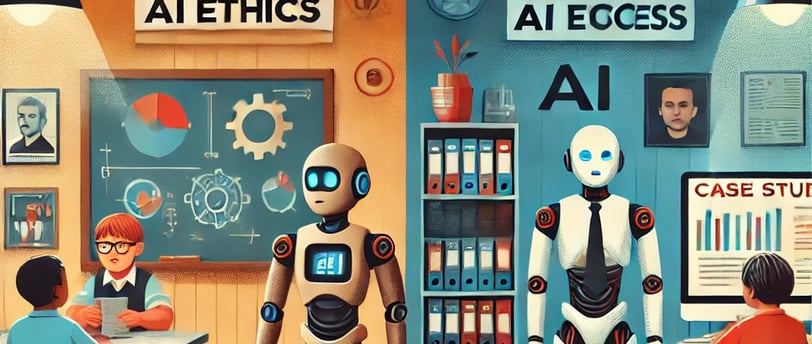Case Studies: When AI Ethics Go Right (and Wrong)
Exploring the Real Impact of Ethical Decisions in AI Development In the rapidly evolving field of artificial intelligence, ethical decisions can make a significant difference in both positive and negative outcomes. This blog post examines case studies where the application of ethical AI principles has led to success, as well as instances where neglecting these principles has resulted in failures.
CASE STUDIES
3/6/20253 min read


Case Studies: When AI Ethics Go Right (and Wrong)
The implementation of artificial intelligence (AI) across various sectors has shown how powerful this technology can be in enhancing human capabilities and improving lives. However, it has also exposed potential ethical pitfalls that can lead to unintended consequences. This blog post explores both sides of the coin—highlighting case studies where AI ethics have guided successful implementations and instances where ignoring ethical considerations has led to failures.
AI Ethics Done Right: Healthcare Innovations
One of the most notable successes in ethical AI implementation is in the healthcare industry. A groundbreaking example is the use of AI in diagnosing diabetic retinopathy, a condition that, if left unchecked, can lead to blindness. Companies like IDx have developed AI systems that can accurately detect this disease at an early stage, allowing for timely treatment. This AI system was among the first to receive FDA approval for diagnosis without the need for a human clinician. The ethical application of AI here respects patient autonomy by providing accurate, accessible care, and maintaining patient confidentiality, setting a standard for how AI can be used to enhance healthcare.
AI Ethics Gone Wrong: Racial Bias in Healthcare Algorithms
On the flip side, an AI system used across many U.S. hospitals was found to exhibit racial bias in prioritizing care management. The algorithm falsely concluded that Black patients were healthier than similarly situated white patients because it used healthcare costs as a proxy for health needs. Since less money was spent on Black patients historically, the AI assumed they needed less care. This case study highlights the critical importance of understanding and correcting for bias in AI systems. It also shows the need for incorporating diverse data sets and perspectives in AI development to avoid perpetuating historical injustices.
AI Ethics Done Right: Conservation Efforts
AI has also been used ethically to tackle environmental challenges. Microsoft’s AI for Earth program uses machine learning to track endangered species, analyze forest health, and predict when illegal deforestation might occur. This initiative shows how AI can be aligned with ethical values such as environmental conservation and biodiversity. By using AI to analyze vast amounts of environmental data quickly, conservationists can act more swiftly and effectively than ever before.
AI Ethics Gone Wrong: Facial Recognition Misuse
Facial recognition technology has often come under fire for ethical violations, particularly regarding privacy and surveillance. A notable misuse was seen in several governments using this technology for mass surveillance without adequate regulations or transparency, infringing on the right to privacy. Furthermore, studies have shown that these systems tend to have higher error rates for people of color, leading to wrongful accusations and arrests. This use of AI highlights the dire consequences of neglecting ethical considerations, such as the need for consent, accuracy, and fairness in AI systems.
Moving Forward with Ethical AI
These case studies demonstrate the dual potential of AI to either promote or hinder ethical values depending on how it is developed and used. Going forward, it is crucial that AI practitioners incorporate ethical considerations at every stage of AI development. This includes:
Engaging Diverse Teams: To ensure AI systems do not reflect or amplify existing biases.
Implementing Rigorous Testing: To detect and mitigate unintended consequences before full deployment.
Establishing Transparent Practices: Ensuring that those affected by AI systems understand how and why decisions are made.
Conclusion
As AI continues to be integrated into every aspect of our lives, the lessons learned from both the successes and failures of AI ethics must inform future developments. By prioritizing ethical considerations and learning from past mistakes, we can harness the full potential of AI to benefit society while minimizing harm. Ethical AI is not just a regulatory requirement—it’s a fundamental aspect of ensuring that technology augments human well-being in a just and fair manner.
Ethics
Explore ethical AI insights for professionals and citizens.
Future
Resources
nt@vsvsv.tech
+91 70757 37467
© 2024. All rights reserved.
